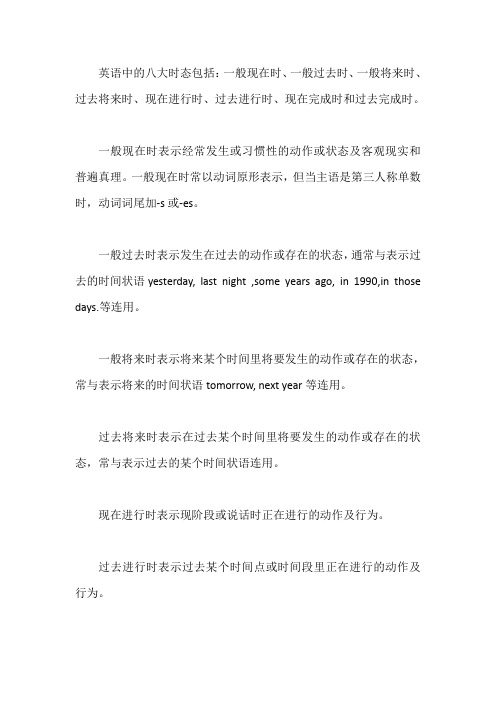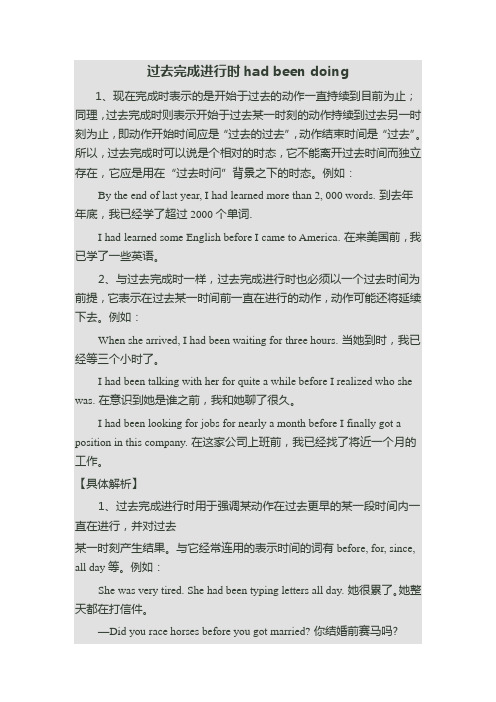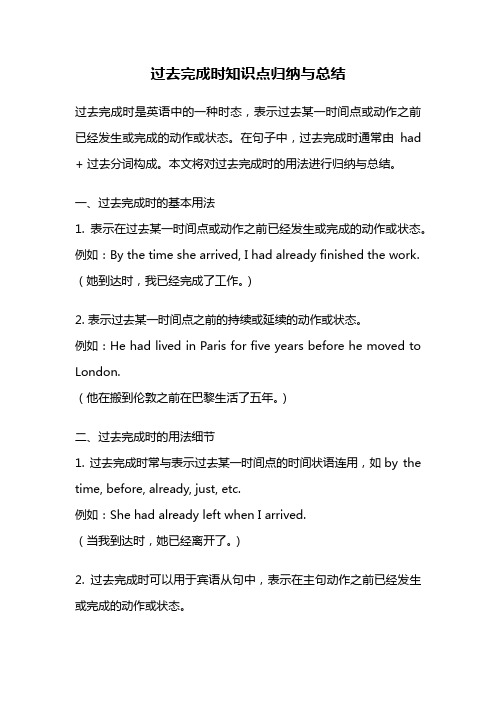英语中过去完成时与过去完成进行时的区别
一般过去时、过去进行时、过去完成时(课堂PPT)

3
常用时间 常与一般过去时态连用的时间有:
yesterday yesterday morning (afternoon, evening…) last night (week, month, year…) two days ago, a week ago, three years ago… in 1990, (in 1998…)
C. has just stared D. had just stared 18
5.I first met Lisa three years ago. She ___ at a radio shop at the time.
A. has worked
B. was working
C. had been working D. had worked
指当时一时的表现12一般过去时与过去进行时的区别1一般过时往往表示某一动作已经完成而过去进行时却表示动作在持续或未完成
一般过去时
1
一般过去时
知识结构
构成 用法 常用时间
动词的过去式
1、表示过去某个时 间发生的动作或 存在的状态。
2、表示过去经常或 反复发生的动作。
yesterday
last night
in 1990
two days ago
2
用法 1、表示过去某个时间发生的动作或存在的状态。
He was here yesterday. I got up at six thirty yesterday morning. My father was at work yesterday afternoon. Did you have a good time last summer?
英语里的八大时态

英语中的八大时态包括:一般现在时、一般过去时、一般将来时、过去将来时、现在进行时、过去进行时、现在完成时和过去完成时。
一般现在时表示经常发生或习惯性的动作或状态及客观现实和普遍真理。
一般现在时常以动词原形表示,但当主语是第三人称单数时,动词词尾加-s或-es。
一般过去时表示发生在过去的动作或存在的状态,通常与表示过去的时间状语yesterday, last night ,some years ago, in 1990,in those days.等连用。
一般将来时表示将来某个时间里将要发生的动作或存在的状态,常与表示将来的时间状语tomorrow, next year等连用。
过去将来时表示在过去某个时间里将要发生的动作或存在的状态,常与表示过去的某个时间状语连用。
现在进行时表示现阶段或说话时正在进行的动作及行为。
过去进行时表示过去某个时间点或时间段里正在进行的动作及行为。
现在完成时表示过去发生的动作对现在的影响,或者过去的动作一直持续到现在。
过去完成时表示过去的某个时间点之前已经完成的动作或存在的状态。
had been doing

过去完成进行时had been doing1、现在完成时表示的是开始于过去的动作一直持续到目前为止;同理,过去完成时则表示开始于过去某一时刻的动作持续到过去另一时刻为止,即动作开始时间应是“过去的过去”,动作结束时间是“过去”。
所以,过去完成时可以说是个相对的时态,它不能离开过去时间而独立存在,它应是用在“过去时问”背景之下的时态。
例如:By the end of last year, I had learned more than 2, 000 words. 到去年年底,我已经学了超过2000个单词.I had learned some English before I came to America. 在来美国前,我已学了一些英语。
2、与过去完成时一样,过去完成进行时也必须以一个过去时间为前提,它表示在过去某一时间前一直在进行的动作,动作可能还将延续下去。
例如:When she arrived, I had been waiting for three hours. 当她到时,我已经等三个小时了。
I had been talking with her for quite a while before I realized who she was. 在意识到她是谁之前,我和她聊了很久。
I had been looking for jobs for nearly a month before I finally got a position in this company. 在这家公司上班前,我已经找了将近一个月的工作。
【具体解析】1、过去完成进行时用于强调某动作在过去更早的某一段时间内一直在进行,并对过去某一时刻产生结果。
与它经常连用的表示时间的词有before, for, since, all day等。
例如:She was very tired. She had been typing letters all day. 她很累了。
英语时态:现在完成时和现在完成进行时区别、过去完成时与现在完成时区别

现在进行时和现在完成进行时区分:区分 have done 和 have been doing,我们需要从两个方面来讨论:一、完成时态和完成进行时态本身意义的差别;二、要结合动词的不同延续特点.首先我们来看两种时态的意义差别两者根本区别是:完成进行时强调动作持续的过程(emphasis on duration), 完成时强调动作的结果或成就 (emphasis on achievement).具体来讲 ,现在完成进行时have been doing 强调的是在一段时期内某项活动的持续性,强调的是动作本身.现在完成时have done 则是强调动作产生的结果或取得的成就,而不是动作本身.二者的这种区别我们从下面的这些例句可以很好地领悟到: (2) a. My hands are very dirty. I ’ ve been painting the house. b. I have painted the house green. The house was white, but now it ’s green.思维分析:句a 中 have been painting 表示 painting 动作一直在持续 ,活动还没有结束 ,所以才有 my hands are very dirty 这样的现状 .句 a 意思是“我的手很脏,我现在一直在给房间刷漆”.句 b 中 have painted 表示 painted 动作已经结束 ,而且动作导致的结果是the house was white, but now it ’ s green 房间现在是绿色的了.现在完成时表示动作业已完成, 而完成进行时却不一定如此I ’ve made a cake. 我做了一个蛋糕.(已做好)I ’ve been making a cake. 我一直在做一个蛋糕. (不一定做好了She’ s painted a picture. 她画了一幅画 .(已画好)She’ s been painting a picture. 她在画一幅画 .(可能还没画好)强调时间长度用完成进行时比较好:I’ve been coughing all night.我咳了一整夜.(比I ’ve coughed all night.更能强调咳得久)All the time she ’s been sitting there in silence.她一直静坐在那里.All these years we ’ve been trying to get in touch with him.这些年来我们一直在设法和他联系.许多静态动词都只能用于完成时而不能用于完成进行时:I ’ve known that for a long time.这事我已经知道很久了.The strike has lasted six months. 这次罢工已经持续了 6 个月 .Nobody has seen him since last week. 从上周起就没人见到过他.raise in salary all the time.他一直盼着加薪.但当意思发生转变时也可能用于完成进行时:I ’ve been thinking of doing so for a long time.我好久以来一直想这样做.Tom has been seeing about a work permit for you.汤姆一直在设法帮你取得工作许可证.有少数动词用两种时态都可以,意思差别不大,如:They have been working very well this term.这学期他们学习很好. They have worked very well this term.It has been raining for two hours.下了两个小时的雨. It has rained for two hours.过去完成时一、过去完成时的概念与结构特点即“过去的过概念:过去完成时表示在过去某一时间或动作之前已经发生或完成了的动作,去( past-in-the-past )”。
过去完成时知识点归纳与总结

过去完成时知识点归纳与总结过去完成时是英语中的一种时态,表示过去某一时间点或动作之前已经发生或完成的动作或状态。
在句子中,过去完成时通常由had + 过去分词构成。
本文将对过去完成时的用法进行归纳与总结。
一、过去完成时的基本用法1. 表示在过去某一时间点或动作之前已经发生或完成的动作或状态。
例如:By the time she arrived, I had already finished the work.(她到达时,我已经完成了工作。
)2. 表示过去某一时间点之前的持续或延续的动作或状态。
例如:He had lived in Paris for five years before he moved to London.(他在搬到伦敦之前在巴黎生活了五年。
)二、过去完成时的用法细节1. 过去完成时常与表示过去某一时间点的时间状语连用,如by the time, before, already, just, etc.例如:She had already left when I arrived.(当我到达时,她已经离开了。
)2. 过去完成时可以用于宾语从句中,表示在主句动作之前已经发生或完成的动作或状态。
例如:I didn't know that she had already seen the movie.(我不知道她已经看过这部电影。
)3. 过去完成时可以用于条件句中,表示与过去某一时间点相反的假设情况。
例如:If I had known you were coming, I would have prepared dinner.(如果我知道你要来,我会准备晚餐的。
)4. 过去完成时可以用于间接引语中,表示在引述的过去时间点之前已经发生或完成的动作或状态。
例如:She told me that she had already finished her homework.(她告诉我她已经完成了作业。
一般过去时与过去进行时的区别和过去完成时与过去完成进行时的区别

一般过去时与过去进行时的区别和过去完成时与过去完成进行时的区别一般过去时和过去进行时的比较一般过去时和过去进行时虽然同是指过去发生的动作或存在的状态,但是,他们还是有很大的质的区别,那就是他们所指的时间有很大的不同。
一般过去时所指的过去时间却比较笼统,而过去进行时所指的过去时间则比较具体。
试比较下面两组句子:A组She joined the League three years ago.The story took place in 1985.Aunt read me a story last night.B组Mary was cooking at this time yesterday.She was doing some washing when I come in.I was sleeping when the thief broke into the house.A组中的three years ago、in 1985、last night 所指的过去时间均较为笼统,因此必须采用一般过去时。
而B组中的at this time yesterday、when I came in、when the thief broke into the house 所指的过去时间均较为具体,因此必须采用过去进行时。
一般过去时和过去进行时,除了他们所指的时间有差别之外,还可以通过他们动作的性质来加以区别。
一般过去时表示在过去某个时间发生的动作或存在的状态,也表示过去经常或反复发生的动作。
它强调的是动作的“发生”或状态的“存在”。
过去进行时表示在过去某一时刻或在过去某一段时间内正在进行的动作。
它强调的是动作的“正在进行”。
试比较下面两组句子:C组Did he watch TV last night?I got up at five yesterday.I studied in that class last year.D组Mum was doing some washing yesterday evening.We were cleaning the classroom this time yesterday.The teacher was talking to some parents when I saw her.C组中的“看电视”、“起床”、“学习”都是属于过去某一时候动作的“发生”或状态的“存在”,所以必须采用一般过去时。
高三英语过去完成时、将来完成时、现在完成进行时、将来进行时
课后作业一、真题演练:单句语法1. When I die, I ____________(give) everything to you.2. That was definitely not an attractive idea, so I politely declined her invitation, .____________(close) m y book and walked away.3. His fear of failure __________(keep) him from classroom games that other students played with joyousabandon.4. _______________(speak) out your inner feeling won’t make you feel ashamed, on the contrary,5. _____________(complete) the project as planned, we’ll have to work two more hours a day.6.It was raining lightly when I___61___ (arrive) in Yangshuo just before dawn.7. This cycle 48 (go) day after day:The walls warm up during the day and cool off during the night and are thus always a timely offset(抵消) for the outside temperatures.8. In 1969,the pollution was terrible along the Cuyahoga River near Cleveland,Ohio.It 61 (be) unimaginable that it could ever be cleaned up.9. Be patient!Tai Chi 66 (call) “shadow boxing” in English.It asks you to act like water:10.Unless some extra money (find),the theatre will close11.When a new day breaks,the walls have given up their heat and are now cold enough 46 (cool) the house during the hot day;at the same time,they warm up again for the night.12. In addition to their simple beauty,what makes the adobe dwellings admirable is their ability to “air condition” a house wi thout 44 (use) electric equipment.13. The adobe dwellings(土坯房) 41 (build) by the Pueblo Indians of the American Southwest are admired by even the most modern of architects and engineers.二、单选题1. When I was young, I ________ with my grandma in the countryside, which is unforgettable.A. livedB. have livedC. was livedD. had lived2. –Excuse me, is the book Gone with the Wind by Margaret Mitchell available now?-Sorry, but it _________ so well that we don’t have any in store.A. sellsB. is soldC. has soldD. has been sold3. The tourism of Linyi _________ rapid growth over the last decade. Now it’s the second most visited city in Shandong Province.A. sawB. had seenC. is seeingD. has seen4. Great changes _____place in my hometown during the past three decades.A. tookB. have takenC. were takenD. have been taken5.Leave me alone. I ________ an article all the afternoon and haven’t finished yet.A. writeB. have been writingC. have writtenD. wrote6. When the power of love _______ the love of power, the world will likely be in peace.A. overcomesB. will overcomeC. is overcomingD. overcame7. Mr. Black ________ Shanghai in a few days. Shall we have a party?A. leavesB. is leavingC. leftD. has left8. –Look, it _________ again.–Yeah. This is the third snow we __________ this spring.A. will snow, are havingB. has snowed, had hadC. is snowing, have hadD. snows, have had9. Mr. White ____ in our school for nearly forty years before he retired last month.A. workedB. has workedC. had workedD. would work10. The project ________ to developing the economy and reducing poverty when it is completed.A. has contributedB. had been contributedC. will contributeD. is contributed11. Nelson Mandela __________ peacefully at his Johannesburg home on Thursday, President Jacob Zuma said.A. diesB. diedC. has diedD. was died12. –I thought you _____________ for vacation tomorrow.-I had planned, but I have a very important meeting to attend tomorrow.A. will leaveB. are leavingC. have leftD. were leaving13. Our manager ________for Shanghai in a few days and he has asked me to find out when the earliest plane ________ next Wednesday.A. is leaving, takes offB. will leave, is taking offC. leaves, will take offD. is to leave, is going to take off14. I’m calling about the apartment you ______the other day .Could you tell me more about it?A .advertised B. had advertised C. were advertising D. will advertise15. Whenever you______a present, you should think about it from the receiver’s point of view.A. boughtB. have boughtC. will buyD. buy16. I walked slowly through the market, where people ______ all kinds of fruits and vegetables. I studied the prices carefully and bought what I needed.A. sellB. were sellingC. had soldD. have sold17. The twins, who _______ their homework, were allowed to play badminton on the playground.A. will finishB. finishC. have finishedD. had finished18. The journey was tiring! All the seats in the train _______. I had to stand all the way.A. were occupiedB. would be occupiedC. would occupyD. had occupied19. Yesterday afternoon, I ______my homework when Mary called.A. had doneB. was doingC. would doD. am doing20. Close the door of fear behind you, and you ______ the door of faith open before you.A. sawB. have seenC. will seeD. are seeing21. Tommy is planning to buy a car. By next month ,he____ enough for a used one.A. saves B .saved C. will save D. will have saved22. She was surprised to find the fridge empty; the child _____ everything!A. had been eatingB. had eatenC. have eatenD. have been eating23. Despite the previous rounds of talks, no agreement______ so far by the two sides.A. has been reachedB. was reachedC. will reachD. will have reached24. More expressways _______in Sichuan soon to promote the local economy.A. are being builtB. will be builtC. have been builtD. had been built25 After school we went to the reading-room to do some reading, only to be told that it _____.A. was decoratedB. had decoratedC. had been decoratingD. was being decorated三、语法填空(共10小题;每小题1.5分,满分15分)阅读下面短文,在空白处填入1个适当的单词或括号内单词的正确形式。
英语16种时态讲解
英语16种时态讲解时态在英语语法中非常重要,它表达了动作或状态发生的时间。
英语共有16种时态,它们分别是:一般现在时、一般过去时、一般将来时、现在进行时、过去进行时、将来进行时、现在完成时、过去完成时、将来完成时、一般过去将来时、现在完成进行时、过去完成进行时、将来完成进行时、过去将来完成时、过去完成进行时、将来完成进行时。
接下来,我将对这16种时态逐一进行讲解。
一般现在时:一般现在时用来表示经常性或习惯性的动作或状态。
它的构成为主语 + 动词原形。
例如:I eat breakfast every morning.(我每天早上吃早餐。
)一般过去时:一般过去时用来表示过去某个时间发生的动作或状态。
它的构成为主语 + 动词过去式。
例如:She studied English last night.(她昨晚学习了英语。
)一般将来时:一般将来时用来表示将要发生的动作或状态。
它的构成为主语 + will + 动词原形。
例如:We will go to the park tomorrow.(我们明天将去公园。
)现在进行时:现在进行时用来表示现在正在进行的动作。
它的构成为主语 +am/is/are + 动词-ing形式。
例如:He is watching TV now.(他正在看电视。
)过去进行时:过去进行时用来表示过去某个时间正在进行的动作。
它的构成为主语 + was/were + 动词-ing形式。
例如:They were playing soccer yesterday.(他们昨天正在踢足球。
)将来进行时:将来进行时用来表示将来某个时间正在进行的动作。
它的构成为主语 + will be + 动词-ing形式。
例如:I will be studying in the library tomorrow.(明天我将在图书馆学习。
)现在完成时:现在完成时用来表示过去发生但与现在有关的动作或状态。
它的构成为主语 + have/has + 动词过去分词。
过去完成时知识点归纳与总结
过去完成时知识点归纳与总结一、过去完成时的构成过去完成时是由助动词"had"和动词的过去分词形式构成的。
动词的过去分词形式通常是在动词原形后加上-ed。
例如:"had seen","had eaten"。
二、过去完成时的用法1. 表示在过去某个时间或动作之前已经发生或完成的动作。
例如:"She had already left when I called her."意思是"在我给她打电话的时候,她已经离开了。
"2. 表示过去某个时间点之前一直持续的动作或状态。
例如:"I had known him for years before he moved away."意思是"在他搬走之前,我认识他已经有很多年了。
"3. 表示对过去某个动作的猜测或假设。
例如:"He had probably gone to bed when I arrived."意思是"当我到达时,他可能已经上床睡觉了。
"4. 与"if only"连用,表示对过去某个动作的遗憾或后悔。
例如:"If only I had studied harder, I would have passed the exam."意思是"要是我当时学得更努力一些,我就能通过考试了。
"三、过去完成时的标志词过去完成时的常见标志词有:"already","just","before","when","after","by the time","until"等。
四、过去完成时与其他时态的区别1. 过去完成时与一般过去时的区别:过去完成时表示在过去某个时间或动作之前已经发生或完成的动作,强调先后顺序;而一般过去时则仅表示过去的动作或状态,没有先后顺序的含义。
人教版选修七unit4、现在完成进行时、过去完成时、过去完成进行时
想起,考虑收到……的来信极想,渴望多达,胜任不久前的一天偶然遇见说实话产生影响,起重要作用突出,伸出完成;打通(电话);通过(考试)参加完全变干;干透在夜间干涸与……有联系使光滑爱上(某人)结束减弱,平息对……进行研究和……结婚在困难中,在危急中支付……费用建立,创立,安排挨饿供养,抚养增加喜欢,想要;照顾,照料过去完成时过去完成时(past perfect)表示发生在过去的两个动作在前的那一个,它表示句子中描述的动作发生在―过去的过去‖。
主语+had+过去分词vpp.(done)①肯定句:主语+had+过去分词.②否定句:主语+had+not+过去分词.③一般疑问句:Had+主语+过去分词?肯定回答:Yes,主语+had.否定回答:No,主语+had not .④特殊疑问句:特殊疑问词或词组+一般疑问句(Had+主语+过去分词)?⑤被动语态:主语+had(hadn't)+been+过去分词(1)表示在过去某一时刻或动作以前完成了的动作,也可以说过去的时间关于过去的动作。
即―过去的过去‖。
可以用by, before等介词短语或一个时间状语从句来表示,也可以用一个表示过去的动作来表示,还可能通过上下文来表示。
与过去完成时常用的时间状语有:1. by + 过去的时间点.2. by the end of + 过去的时间点3. before/after + 过去的时间点(2)表示由过去的某一时刻开始,一直延续到过去另一时间的动作或状态,常和for, since构成的时间状语连用。
(3)叙述过去发生的事情,在已叙述了过去发生的事情后,反过来追述或补述以前发生的动作时,常使用过完。
(4)在含有定语从句的主从复合句中,如果叙述的是过去的事,先发生的动作常用过去完成时。
(5)过去完成时常常用在told, said, knew, heard, thought等动词后的宾语从句(或间接引语)中,这时从句中的动作发生在主句表示的过去的动作之前。
- 1、下载文档前请自行甄别文档内容的完整性,平台不提供额外的编辑、内容补充、找答案等附加服务。
- 2、"仅部分预览"的文档,不可在线预览部分如存在完整性等问题,可反馈申请退款(可完整预览的文档不适用该条件!)。
- 3、如文档侵犯您的权益,请联系客服反馈,我们会尽快为您处理(人工客服工作时间:9:00-18:30)。
过去完成时和过去完成进行时都表示过去的动作,但是它们的用法和格
式有很大不同。
一、过去完成时描述一件发生在过去且在过去完成的动作,更重要的是
它表明在过去一件事发生在另一件事之前,格式为had + 动词的过去分词,例如:
He had saved the document before the computer crashed.
他在电脑死机前保存了文件。
解析:此句有crashed 和saved 两个过去动作,saved 发生在crashed 之前,且动作已经完成,所以saved 用过去完成时。
He had cooked breakfast when I got up.
我起床时他做了早餐。
解析:此句有got up 和cooked 两个过去动作,cooked 发生在
got up 之前,且动作已经完成,所以cooked 用过去完成时。
I recognized her because I had seen her on TV.
我认出她是因为我在电视上见过她。
解析:此句有recognized 和seen 两个过去动作,seen 发生在recognized 之前,且动作已经完成,所以seen 用过去完成时。
He had lost consciousness by the time the ambulance reached the hospital.
当救护车到达医院时,他已经失去了知觉。
解析:此句有reached 和lost 两个过去动作,lost 发生在reached 之前,且动作已经完成,所以lost 用过去完成时。
二、过去完成进行时描述一件发生在过去且一直持续到过去的某个时间
的动作,只能用延续性动词,格式为:had + been + 动词的现在分词形式,例如:
She had been waiting for more than one hour when her friends finally arrived.
她等了一个多小时,朋友们终于来了。
解析:此句有arrived 和waiting 两个过去动作,waiting 发生在arrived 之前,且waiting 一直持续到arrived 这个动作,所以waiting 用过去完成进行时。
It had been raining for several hours, and the streets were slippery. 雨下了几个小时,街道很滑。
解析:此句有were 和raining 两个过去动作,raining 发生在were 之前,且raining 一直持续到were 这个动作,所以raining 用过去完成进行时。
My parents had been thinking of calling the police when I finally went home around 2 am.
当我终于在凌晨2点左右回家时,我父母一直在考虑报警。
解析:此句有went 和thinking 两个过去动作,thinking 发生在went 之前,且thinking 一直持续到went 这个动作,所以thinking 用过去完成进行时。
Jamie had lost weight because she had been skipping meals.
杰米瘦了是因为她一直不吃饭。
解析:此句有had lost 和skipping 两个过去动作,slipping 发生在had lost 之前,且skipping 一直持续到had lost 这个动作,所以slipping 用过去完成进行时。
过去完成进行时还可以表示过去反复的动作,例如:
He had been studying all day.
他学习了一整天。
Y ou had been giving me everything.
你对我真是有求必应。
He had been mentioning your name to me.
他一直在跟我提你的名字。
